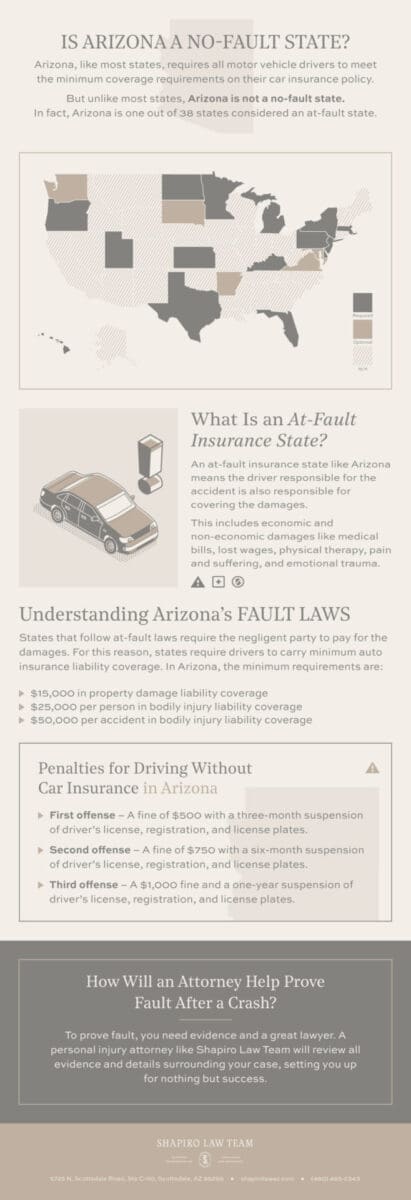Arizona, like most states, requires all motor vehicle drivers to meet the minimum coverage requirements on their car insurance policy. But unlike most states, Arizona is not a no-fault state. In fact, Arizona is one out of 38 states considered an at-fault state. This means that if you were injured as a result of an auto accident, you have the right to file a claim with the negligent driver’s insurance company.
Shapiro Law Team is an experienced law firm capable of taking on your car accident case and representing your right to secure maximum compensation. Ask about the legal details of a car accident claim when you contact us for a free consultation.
An at-fault insurance state like Arizona means the driver responsible for the accident is also responsible for covering the damages. This includes economic and non-economic damages like medical bills, lost wages, physical therapy, pain and suffering, and emotional trauma.
The difference between an at-fault state and a no-fault state boils down to compensation. In an at-fault state, it’s up to the negligent driver to compensate for the damages once you’ve proven they were at fault.
In a no-fault insurance state, an injured driver can seek compensation through their own insurance company, regardless of who was at fault. These states require drivers to purchase personal injury protection (PIP) coverage. This coverage is used to pay for economic and non-economic damages.
Additionally, the injured driver doesn’t have to prove the other driver was negligent to receive compensation.
No, Arizona is not a no-fault state. Since Arizona is considered an at-fault state, car accident victims must prove the other driver was negligent. This is where the help of a seasoned car accident attorney comes in handy.
By gathering and presenting evidence, Shapiro Law Team will help you prove negligence and win your rightfully deserved compensation. If you’ve been in a car accident, we advise you to hop on a call with a licensed attorney. Our consultations are 100% free and confidential.
States that follow at-fault laws require the negligent party to pay for the damages. For this reason, states require drivers to carry minimum auto insurance liability coverage. In Arizona, the minimum requirements are:
Even though all drivers must carry minimum insurance coverage, many drivers don’t. In a case where you’ve been hit by an uninsured motorist, you can file your claim with either your uninsured motorist coverage or you can file a lawsuit with Maricopa County’s civil court.

Is Arizona a No-Fault State?
Most car accidents involve a victim and a negligent driver—but sometimes parties share the blame. When parties share a percentage of the blame, this is known as comparative negligence.
Arizona is a pure comparative negligence state, meaning that no matter how much you are to blame for the accident, you still have a right to recover compensation.
That being said, you might not fully be compensated. For example, if you were involved in a crash with damages of $20,000 and you were found to be 20% at fault, your compensation would be reduced by $4,000.
Despite the penalties, it’s estimated that approximately 11.9% of drivers are uninsured in Arizona. This isn’t just unlawful, but unsafe. Law enforcement will ask for proof of insurance during a traffic stop or after a car accident.
If you have valid insurance but forgot a physical copy, you may be able to get a pass. But if you don’t have insurance at all, you can expect some penalties.

Penalties for Driving Without Car Insurance in Arizona
It’s unfortunate, but too many drivers are driving without insurance. Since the rate of uninsured Arizona drivers is so high, it pays to protect yourself with optional insurance coverage. The two most helpful types of insurance for uninsured motorists are:
To prove fault, you need evidence and a great lawyer. A personal injury attorney like Shapiro Law Team will review all evidence and details surrounding your case, setting you up for nothing but success. We’ve achieved millions of dollars in settlements for clients across Maricopa County. Call for a free consultation from the personal injury law firm Arizona trusts. You have nothing to lose.